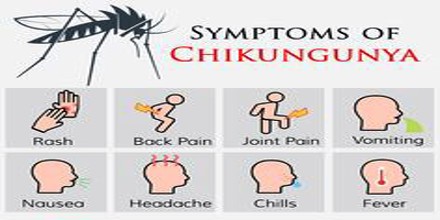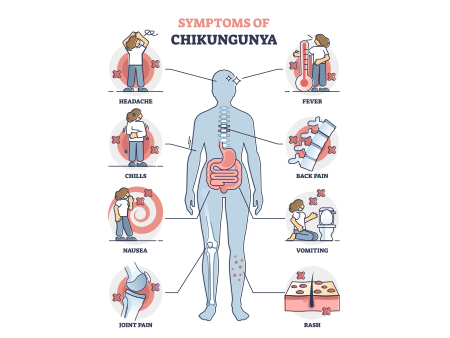Symptoms of Chikungunya

The virus responsible for chikungunya can be transmitted through mosquito bites. The onset of illness typically occurs four to eight days after exposure, but it can occur between two and twelve days. The first symptom of chikungunya infection is an acute bout of joint pain and fever. This can last for a few days or weeks, or it can continue for months. Although there is no cure for chikungunya, a few treatments can help alleviate some of the symptoms and make the disease much more manageable.
Because there are no specific antivirals for chikungunya virus, treatment is symptomatic. Non-salicylate analgesics and non-steroid anti-inflammatory agents can be prescribed. People with chikungunya are unlikely to develop the disease again, but they do have lifelong immunity against re-infection. Fortunately, there is no cure for the disease, but early detection is the key to reducing the risk of complications and death.
Symptoms of chikungunya virus infection begin three to seven days after exposure to a mosquito. The most common symptoms are fever and joint pain. Other symptoms include muscle aches, joint swelling, and rash. The virus can also cause a severe infection, particularly in infants under one year old. A laboratory test may confirm the presence of chikungunya virus or detect antibodies.
The virus is spread through autochthonous transmission, with cases being imported from infected travelers. In Europe, the disease has occurred in sporadic locations. An outbreak of chikungunya occurred in Italy in 2007 with 217 laboratory-confirmed cases. In the Americas, chikungunya has been reported in countries such as the Cook Islands and the Marshall Islands.
The virus is a single-stranded, positive-sense RNA enveloped virus infecting humans. The virus has been identified in several countries across Europe and the Pacific. During this outbreak, it affected more than 1400 people in France. The European Centre for Disease Prevention and Control (ECDPC) has recorded 72 cases in 2013 in Asia, and the US, France, and UK are currently experiencing outbreaks.
Symptoms of chikungunya infection vary from person to person. Most patients with symptoms should see a doctor. Some cases may be accompanied by fever or another condition, such as arthritis. It is important to seek medical help if you suspect you have chikungunya as treatment can be difficult in some parts of the world.

The virus is spread by mosquitoes infected with chikungunya. This can cause joint pain and fever. Although chikungunya is rarely fatal, symptoms can be long-lasting and severe. It has now been reported in more than a quarter of the world. The virus is transmitted by female mosquitoes and is usually transmitted through mosquito bites. There are no specific antiviral drugs for chikungunya.
The Centers for Disease Control and Prevention (CDC) reports that in 2014, cases of chikungunya were reported in 44 states and the U.S. Virgin Islands. There is no vaccine for chikungunya, so prevention is essential. However, mosquito bites are not the only carriers of the virus. They can also be carried by mosquitoes. This disease is spread by mosquitoes. This disease is caused by the ingestion of infected feces into the bloodstream and is also known to spread from person to person.
Although no antiviral drugs have been developed specifically for chikungunya, it can be treated with non-steroidal anti-inflammatory drugs. Infected people should drink plenty of water to avoid dehydration. To draw up a complete treatment plan, the doctor must monitor the patient’s symptoms. If they have a high fever, they should take antipyretics and fluids to relieve pain.
Before traveling to a country with a high risk of chikungunya, it is best to use insect repellants to protect the skin and body. Infected mosquitoes are the main vectors of chikungunya and are responsible for most cases of chikungunya. Website https://www.ctrip.co.th/
reminds that although the virus is not transmitted from one person to another, symptoms of the virus can range from mild to severe.
The most common symptoms of chikungunya include fever and joint pain. This condition can also affect the eyes, nervous system, and nervous system. Fortunately, most cases of chikungunya have a short duration of symptoms and are treatable without further complications. But the symptoms may not last long and persist for months or even years. Patients with chikungunya should be aware that the disease can affect them even if they are not allergic to the virus.
Leave a Reply